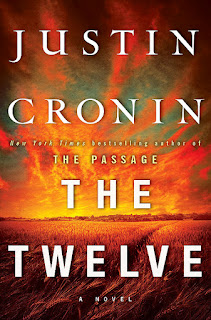In my preview of new books for 2012, I omitted the one book
I am most eager to get my hands on – Justin Cronin’s sequel to The
Passage. The March 16 issue of
Entertainment Weekly reports that The Twelve will be released in the U.S. on
October 16. It also has a passage
from the second chapter of the new book.
(This isn’t the first peek at the new book - the paperback edition of
The Passage had a preview of The Twelve in it.) (By the way, this American cover is pretty lame. Looks more like a heart-wrenching tale about farmers at harvest time than the horrors of life long after a vampire apocalypse. The UK cover is much better.)
I haven’t read either of these early excerpts because I fail
to see the point in sampling a few hundred words when I still have months to
wait for the next 600 pages. (And for a book that is only part two of a trilogy.) And its not like I need a sample to
ascertain whether or not I will want to read the book – I already know I
do. News of the impending arrival
of The Twelve has me considering whether or not to re-read The Passage. I probably will re-read The Passage by October – just to familiarize myself with the large cast of characters in it. I rarely re-read anything anymore – it
is hard to justify spending the time on something old when there is so much new
to read. I used to reread Donna Tartt’s The Secret History and James Crumley’s
The Last Good Kiss every few years.
Haven’t done that for a long time now.
This past week I found myself re-reading Robertson Davies’
The Rebel Angels and enjoying it even more the second time around. The Rebel Angels is volume one of
The Cornish Trilogy – three books about the legacy of Francis Cornish, a
Canadian art collector. (Davies
has a thing for trilogies – most famously The Deptford Trilogy as well as The Salterton
Trilogy.) In the first book, a
cast of scholars at a Canadian college scheme to gain control of the estate of
the recently deceased Francis Cornish. This is a terrible simplification of a very rich and entertaining book whose subject matter runs from medieval history, mythology, folklore, gypsy culture, paleo-psychology, cultural fossils, art history, Rabelais, Renaissance manuscripts, academic satire, excrement, christianity, and murder. These are, mostly, subjects I would run from - but from Davies the result is akin to the longest and most entertaining story you've ever heard (the book is very talky - lots of lengthy dialogue).



1 comment:
I'm pondering re-reading The Passage as well, although as you say, that means one less "new" (read: old in my case) novel read this year. But then I suppose it'll still count towards my overall total come year's end.
Post a Comment